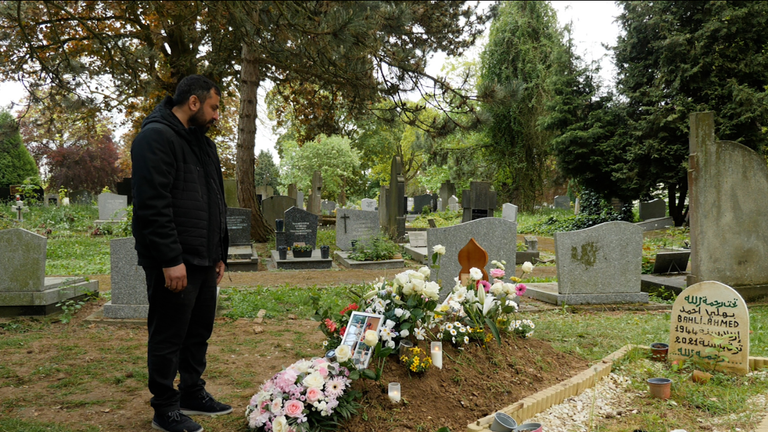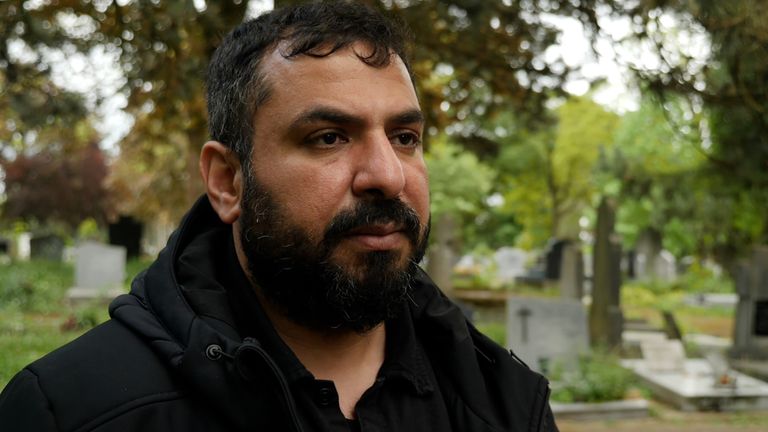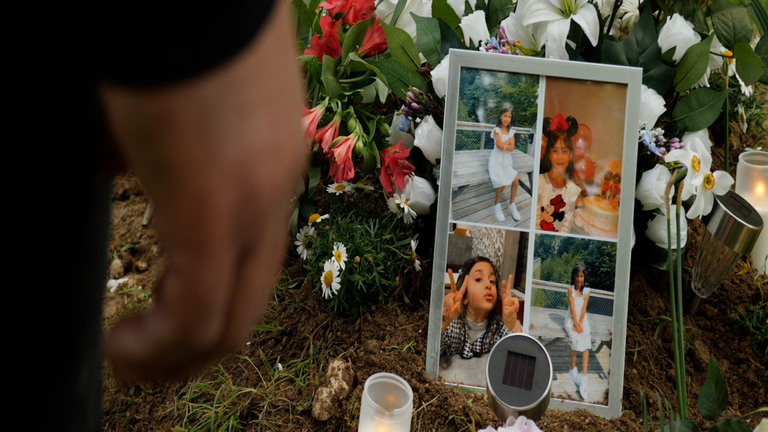There are times when a person is so gripped with helpless despair that they are lost within themselves. Ahmed Alhashimi, a proud man, looks at the small coffin, wrings his hands, stares at the ground and weeps.
Inside the bright white coffin is the body of his daughter, Sara. Watched by a small crowd of family members, charity workers, well-meaning locals and even council workers, her coffin is lowered into a grave.
Then, for 10 or 15 minutes, a group of mourners work hard to use shovels, and even bare hands, to fill the grave with earth.
The mound is patted down, a wooden marker put in place, with her name engraved upon it, and flowers are placed on the grave along with flowers, photos and – crushingly – a favourite soft toy.
Sara died after being crushed on an overcrowded migrant boat

Watched by a small crowd of family members, charity workers, well-meaning locals and even council workers, Sara’s coffin was lowered into a grave
Sara was just seven years old when she died a fortnight ago, crushed on a horrendously overcrowded migrant boat that left shore with more than 100 people on board.
Four other people died that day, too. But it is the image of Sara – young, innocent and vulnerable – that lingers. The death of a child is chilling for anyone. For her family, it is devastating.
They want to remember her, to celebrate and mourn. And so it is that, as we stand next to the morgue where his daughter’s body rests, Ahmed actually wants to talk to me.

Sara’s dad, Ahmed Alhashimi
He invites us to spend the day with him, travelling to the morgue in Lille where prayers are offered, and then to her burial.
“For all the sadness and sorrow, those final scenes of her life are ones that I will never forget,” he tells me, glassy-eyed.
“When she was taken out of the boat, those scenes I will never forget for the rest of my life.
“I lost my daughter. Every father who has a daughter, who knows the love you get from a daughter, can imagine the feeling they would suffer if they were to lose their daughter. For me – I am not imagining. I lost her for real.”

‘She was like a butterfly, like a bird, she was everything to us’, Sara’s father said about his daughter
The story of cross-Channel migration is a long one, and it is pockmarked with victims. But Sara is unusual in this. Her parents were Iraqis, but they met in Belgium, where Sara was born while her parents lived in Antwerp.
The family spent some time in Finland, but then tried to make their lives in Sweden. Sara went to school there and learned the language.
Other members of her extended family had been given asylum in the country but, for some reason, Ahmed’s immediate family were denied that status.
They feared being deported back to Iraq and so, instead, decided to try to reach the United Kingdom.
“We were in Sweden for seven years and we did not even think of leaving” Ahmed tells me. “Our children would go to school and live their normal lives. But when we were obliged to leave Sweden, when we received the deportation letter, I was left with no alternative.
“I had no choice,” Ahmed says. “I wanted to protect her life, I wanted her to have a future, a life with dignity like other children, but I could not. Everything went against me.
“The Swedish government, and the immigration officials, are the reason behind the tragedy we suffered. We are talking about children, who were born here in Europe. How could you send them to Iraq?”
I wonder whether he has thought of the future, of what would happen to his family now. Does he still hope to cross the Channel?
Ahmed shakes his head. “Of course not, of course not,” he says, gently. “I do not think of that any more, just the thought of that hurts me.
“I lost my child, I lost my daughter. She was like a butterfly, like a bird, she was everything to us, the light in our home, our source of laughter, she was everything. I lost her and I do not want to lose her brothers.”

Keep up with all the latest news from the UK and around the world by following Sky News
He says the boat on which they were travelling was packed, but safe until it was boarded by a rival group of migrants.
“They attacked us,” he tells me. “The water was only a metre deep but there was chaos. That’s when people suffocated.”
His hope now is that the British government will see his pain, feel his loss, and offer hope.
“I call on the British people and the government to help me reach Britain legally. I don’t want assistance. I can work, so can my wife. I just want security and safety for my children. That is all.”
Sara lies now under the shade of a tree in Lille’s cemetery. A girl born in Belgium, to Iraqi parents, who grew up in Sweden and was bound for Britain – now laid to rest in northern France.
It is an awful reminder that there is nothing simple about the challenge of migration. The questions are profound, and the tentacles spread far. And it is also a dire warning – this has been a record year for crossings, and for deaths.
So far this year, I have already been to the funerals of two seven-year-old girls who died trying to cross the Channel on a small boat. There will, inevitably, be another tragedy. The only question is when.







